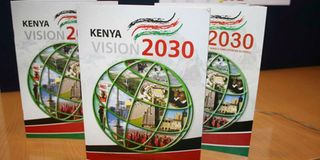Vision will revamp nation

Kenya Vision 2030 document.
What you need to know:
- Consumers with a positive economic outlook report more positive spending intentions, which boosts domestic demand.
- The costly vices of money laundering, tax evasion and tax avoidance are key impediments to the taxman meeting its revenue targets, hence huge budget deficits.
Recently, the Kenya Vision 2030 Delivery Board and Kenya Editors Guild convened a bold, stellar and high-level forum to create national awareness about the progress of Vision 2030 and the journey to realising it.
That was good because effective communication boosts consumer confidence, a fundamental driving force for the economy. Consumers with a positive economic outlook report more positive spending intentions, which boosts domestic demand.
But it is important to address the following policy areas that are likely to derail the full implementation of the economic blueprint if left unattended.
One is low allocation for development expenditure. For instance, of the approved national government budget of Sh3.66 trillion for the 2021/22 Financial Year, only Sh135 billion was set aside for the ‘Big Four Agenda’ —food security, affordable housing, manufacturing and universal health coverage.
The Public Finance Management (PFM) Act 2012 provides that, over the medium term, at least 30 per cent of the national and county government budgets be allocated to the development expenditure. The National Treasury should always ensure that allocation to development is within the law.
The second is delays in exchequer releases, which affect timely delivery of services and creates huge pending bills. The stipulated 25 per cent of the annual estimates must be disbursed by Quarter 1.
Third is the high public debt. Increased reckless public borrowing has resulted in undesirable fiscal consequences. As of June, the gross public debt was Sh7.7 trillion. The government must ensure that its financing needs and payment obligations are at the lowest market cost and with prudent risk.
The fourth is tax corruption. The costly vices of money laundering, tax evasion and tax avoidance are key impediments to the taxman meeting its revenue targets, hence huge budget deficits.
The right kind of policy mix, political will and determination will augment economic growth, improving the well-being of citizens as envisioned.
Mr Ombane is an economist. [email protected].





